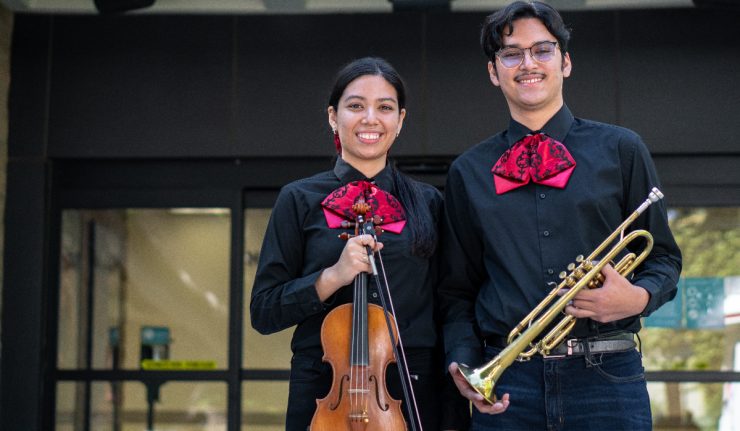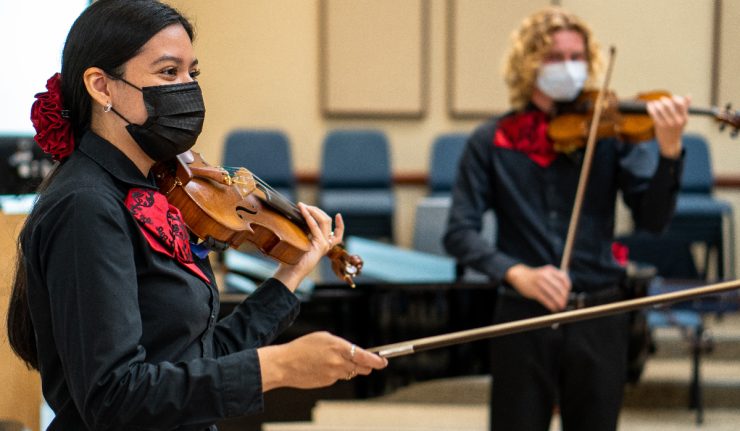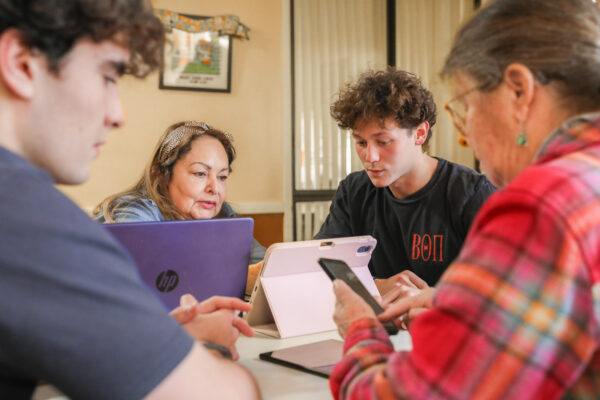Mariachi is a beloved musical tradition, the cheerful Sunday brunch sound that fills the air at Mexican restaurants, the music that marks celebrations ranging from birthdays to weddings throughout Mexico and the American southwest.
But for Chapman University students Erandi Sanchez ’22 and Lino Sanchez ’25, it is family, life and heritage. In addition to their classical music training, the sister and brother have studied and performed the traditional folk music since childhood, grateful to continue a beloved tradition from their culture.
“When I play mariachi it’s a completely different feeling from when I play classical music or jazz. I have some deep emotional connection to it,” Erandi Sanchez says.
For Lino Sanchez, “Playing it fills me with a sense of honor … It makes me proud, it makes me happy.”

Now that passion is helping shape a new student performance ensemble in Chapman’s College of Performing Arts.
It all began last year when Assistant Professor Tammy S. Yi asked Erandi Sanchez and Julian Garrido-Figueroa ’21 if they would be interested in helping launch a mariachi ensemble at Chapman as part of her effort to develop the college’s world music offerings. The students were all in. Yi landed a $5,000 grant from the Office of the Provost for essential instruments – the guitarrón, a large bass guitar, and vihuela, a five-string guitar with a hump back. Rehearsals went virtual, as so much did last year. But they persevered.
A First for Orange County
The result is the course Mariachi, directed by Yi, Ed.D., within the college’s Hall-Musco Conservatory of Music. This semester they meet in person, with the Sanchez siblings lending extra coaching to classmates new to the genre.
The group performs under the name Mariachi Panteras, a nod to Chapman’s venerable Pete the Panther mascot, and is Orange County’s first collegiate mariachi ensemble. They debuted in May at Heartbeat of Mexico.
“The students are very proud to see their cultural heritage reflected in the music curriculum and to also create an inclusive space for students,” says Yi, a violinist, strings specialist and orchestra conductor who teaches music education and is a semifinalist for the 2022 GRAMMY Music Educator Award.
Indeed, Yi envisions the ensemble as a way to help grow campus diversity. Through a partnership with the mariachi program at Santa Ana High School, she occasionally lectures there and their instructor assists with the Chapman class.
“This is all part of a bigger goal. I want Santa Ana High School mariachi students and Chicanx students to see themselves at Chapman and to continue playing mariachi,” Yi says. “I love the fact that we can build community with mariachi.”
Mariachi Teachers in Demand
The ensemble experience also supports career goals for music education majors, says Yi, who began performing mariachi in college and continued while teaching at the University of Arizona. High schools across the southwest are keen to grow their programs, especially in states like Texas where mariachi competitions are as competitive as Friday night football.
Plus, adding mariachi to the conservatory curriculum is recognition of its artistry, a genre that should share the stage with classical traditions, Yi says.
“It’s important that students of color and those who come from immigrant families feel seen, valued and have their traditions recognized. For students who may not come from a mariachi background, they still benefit from learning about the rich culture of Mexico,” she says.
The genre is challenging for many newcomers at first because it relies on musicians’ abilities to learn unscored music through ear training, master a variety of styles reflecting regional sounds and – a hallmark – field requests from listeners.
“It’s not simple folk music. It’s complicated,” Erandi says.
Thriving on Teamwork
Agreed, says her classmate David Anderson ’23, a violin performance major with a minor in music business. This is his first semester with the ensemble and he says stepping outside his comfort zone has helped him grow as a musician and introduced him to a performance style that thrives on teamwork.
“One thing that’s really kind of different from classical stuff is that everything we learn is by ear and by people showing each other how to play,” Anderson says. “With sheet music you get sucked into it a little bit, but with mariachi you can pay a lot more attention to what’s going on around you. It’s very fun.”
Ultimately, it’s the universal notes that resonate for all.
“The purpose of music is to bring people together,” Yi says. “And mariachi reminds us of the immense beauty in music’s diversity.”




